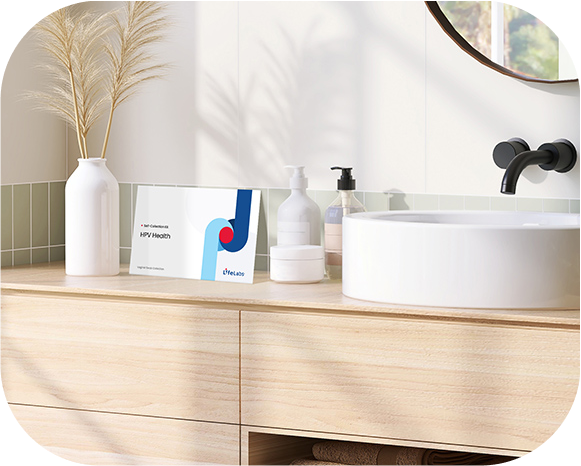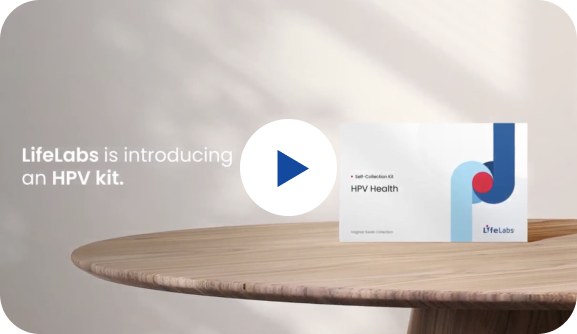Important: HPV testing is now provincially covered in Ontario and has replaced cytology as the primary test for cervical screening. You can speak with your healthcare provider to determine your eligibility for provincially covered testing.
Below testing options are available for patients without OHIP coverage or for those who are not eligible for the Ontario Cervical Screening Program.
Most Popular
-
Convenient & Fast Online Ordering
Order the test from the comfort of your home. Request form provided with no visit to your doctor required.
-
Self Collect Easily, Delivered to Your Door
With a small swab and easy-to-follow instructions, you can collect your sample when and where it works best for you.
-
Immediate, Secure Results Access
When your results are ready, you will receive a notification to access your results over our secure platform.
-
Order through your healthcare provider
Visit your health care provider to find out if HPV testing is right for you.
-
Book a clinic visit
Your health care provider will collect your sample during your initial or subsequent visit.
-
Results via your health care provider
When your results are ready, your health care provider will review and discuss them with you.
Are you eligible for provincially covered testing?
People are eligible for cervical screening if they:
- Are a woman, Two-Spirit person, transmasculine person or nonbinary person with a cervix, and
- Are at least 25 years old, and
- Have ever had sexual contact with another person, and
- Do not have symptoms, like different bleeding or discharge (clear or yellow fluid) from the vagina (genital opening)
People should still get screened if they:
- Have had the HPV vaccine
- Feel healthy
- Have been through menopause
- Have not had any family members with cervical cancer
- Have had sexual contact with only one person
- Have had the same sexual partner for a long time
- Have not had sexual contact in a long time
- Are in a same-sex relationship
- Have only had protected sexual contact
- Are pregnant
- Have had a subtotal hysterectomy and kept their cervix
In Ontario, provincial coverage is available once every five years for eligible patients.
Most people can stop cervical screening from ages 65 to 69. Some people may get cervical screening tests after age 69 based on their medical history or screening test result history.
People with provincial health coverage can discuss their eligibility for a provincially covered testing with their healthcare provider.

Cervical Health (HPV) KitAccessible, convenient and comfortable HPV testing
Testing for HPV is an important step in detecting cervical cancer early, but many people aren’t able to complete the test in a doctor’s office. Some may be too embarrassed or anxious, while others can’t access a health care provider.
The Cervical Health (HPV) Kit by LifeLabs offers a quick, easy, and convenient way to collect your sample in the comfort and privacy of your home.
What is HPV? How is HPV linked to cervical cancer?
Human Papillomavirus, or HPV, primarily spreads through sexual activity. It causes 95% of cervical cancer cases. The symptoms aren’t always obvious, so most people with HPV don’t even know they have it.
There are two types of HPV: high-risk and low-risk. Two of the high-risk HPV types (16 and 18) cause majority of the cervical cancers and pre-cancerous cervical cell changes. Infection from a high-risk HPV can cause cervical cancer if not found and treated.

Why is HPV testing important?
Testing can tell you if you are infected with a high-risk HPV type.
Early detection can help your doctor determine a treatment plan to prevent or treat cervical cancer.

Who should get tested for HPV?
The Cervical Health (HPV) kit is for individuals who are proactive with their cervical health and promote early detection for cervical cancer. When it comes to preventing cervical cancer, early detection makes all the difference.
The kit offers convenience and flexibility for those who are not eligible for OHIP, or the Ontario Cervical Screening Program.
Even if you have received the HPV vaccination, it’s recommended to get tested.
To use the test, you must not be menstruating, pregnant, or have given birth in the last three months.
Order a kit today
The HPV Kit is a quick and easy way to collect your vaginal sample from the comfort and privacy of your home
Frequently Asked Questions
-
What is HPV and how is it linked to cervical cancer?
-
The human papillomavirus, or HPV, is a group of over 150+ related viruses which are primarily spread through sexual activity. Most adults will develop an HPV infection in their lifetime without knowing it as HPV often doesn’t have any symptoms.
Frequently, the virus will clear in the same way as a common cold. However, some high-risk HPV types don’t clear.
A high-risk HPV infection can cause cells to change or become abnormal. In the cervix, these changes can lead to the development of precancerous cells (dysplasia). If not treated, these cells can lead to cervical cancer.
HPV testing can detect high-risk HPV infections before they cause cervical cancer. With early detection, cervical cancer is one of the few cancers that can actually be prevented.
-
How is HPV testing different from Pap testing?
-
HPV testing looks for the presence of high-risk HPV types commonly associated with cervical cancer.
The Pap test looks for abnormal cell changes.
-
Who is this test for?
-
HPV testing is available for anyone with a cervix aged 25 years and over and sexually active.
Your health care provider may also decide to order an HPV test along with your Pap test or to assist with follow up on abnormal Pap results.
Even if you have received the HPV vaccination, it’s recommended to get tested.
To use the test, you must not be menstruating, pregnant, or have given birth in the last three months.
Note: Until HPV testing is implemented in the Ontario Cervical Screening Program, cervical screening with a Pap test is safe, accurate and allows people to receive key benefits of organized screening (e.g. correspondence letters). LifeLabs offers the collection kit to complement existing services, and to encourage patients in maintaining regularity when it comes to essential health testing services so they can make informed decisions with their health care providers about their health.
-
How can I get tested?
-
There are two options to collect your sample for HPV testing:
1. At-home (collect your own sample)
If you would like to collect your sample yourself, order your kit today. Learn more about the self-collection process and instructions.2. In a clinic (collected by your health care provider)
If you prefer, you can ask your health care provider about getting your sample collected at their clinic. Your health care provider will complete and sign the HPV test requisition, collect a cervical sample in a similar manner as a Pap test, and send it to LifeLabs for analysis. -
What does the test cost?
-
1. The Cervical Health (HPV) Kit by LifeLabs is $129.
The kit includes a self-collection swab and a pre-signed request form. Anyone with positive results will be contacted by the clinical support team to discuss next steps.2. The test collected by your health care provider is $95.
If your health care provider has already collected your sample, we will mail you an invoice, which you can pay here.Note: Patients are encouraged to check with their private health care insurer to see if coverage is provided.
-
I want my HPV sample collected at a clinic by a doctor. What steps should I follow?
-
For next steps getting this test, go to How to order.
-
How will I receive my results?
-
For at-home collection,your results will be available online. A notification will be sent to you when your results are ready from our secure platform.
For samples collected by your health care provider, test results will be provided directly to your health care provider for discussion with you.
-
What is the difference between the high-risk and low-risk types of HPV?
-
The HPV test screens for high risk types of HPV and not low risk types. This is because certain high risk types may cause cervical cancer and cancer of the throat, tongue, anus, or vagina. The low-risk HPV types mostly cause genital warts in the vagina, cervix, and on the skin, that mostly clear on their own.
As infection with low-risk HPV types do not lead to cancer, the HPV test is not recommended for detecting low-risk HPV infections.
-
What do my results mean?
-
If the result is HPV positive, it means the test detected a high-risk HPV type. This does not mean you have cancer. You will be contacted to book a follow-up appointment to answer your questions and for further assessment to determine if a Pap or a colposcopy is needed. If you like, your results can be shared with your primary health care provider.
If the result is HPV negative it means the test did not detect a high-risk HPV type. You are at low risk of cervical cancer. You may still require an in-person visit with a health care provider or further investigation if:
- You previously had cervical cancer
- Are immunodeficient/immunocompromised
- Or experience abnormal bleeding during menstruation, between cycles, after sexual intercourse or any post-menopausal bleeding
Indeterminate or unsatisfactory results: In a small number of cases, your result may be indeterminate (meaning that the test didn’t provide a clear negative or positive result) or unsatisfactory (for example, there were not enough cells present in the sample or your sample was contaminated) and may require a new sample or further follow-up. A clinical support team member will contact you to discuss this further.
-
How often should I test for HPV?
-
HPV testing is recommended every 5 years. Screening too frequently does not provide extra protection. Most high-risk HPV infections clear on their own. Pre-cancer and cancer that can develop as a result of a persistent high-risk HPV infection take many years to develop.
-
I have a new sexual partner. Should I order an HPV test for sexually transmitted infection (STI) screening?
-
Regular testing for STIs such as chlamydia and gonorrhoea is important. HPV testing should only be used for cervical screening. HPV testing should not be used as an STI test (for example, to determine if someone has contracted an HPV infection from a new sexual partner).
There is no treatment for high-risk HPV infections. Only persistent high-risk HPV infections cause cervical cancer, but it takes many years to develop. Only the pre-cancer and cancer that can develop as a result of a persistent high-risk HPV infection can be treated.
-
Sources


 Return to collection guide
Return to collection guide


